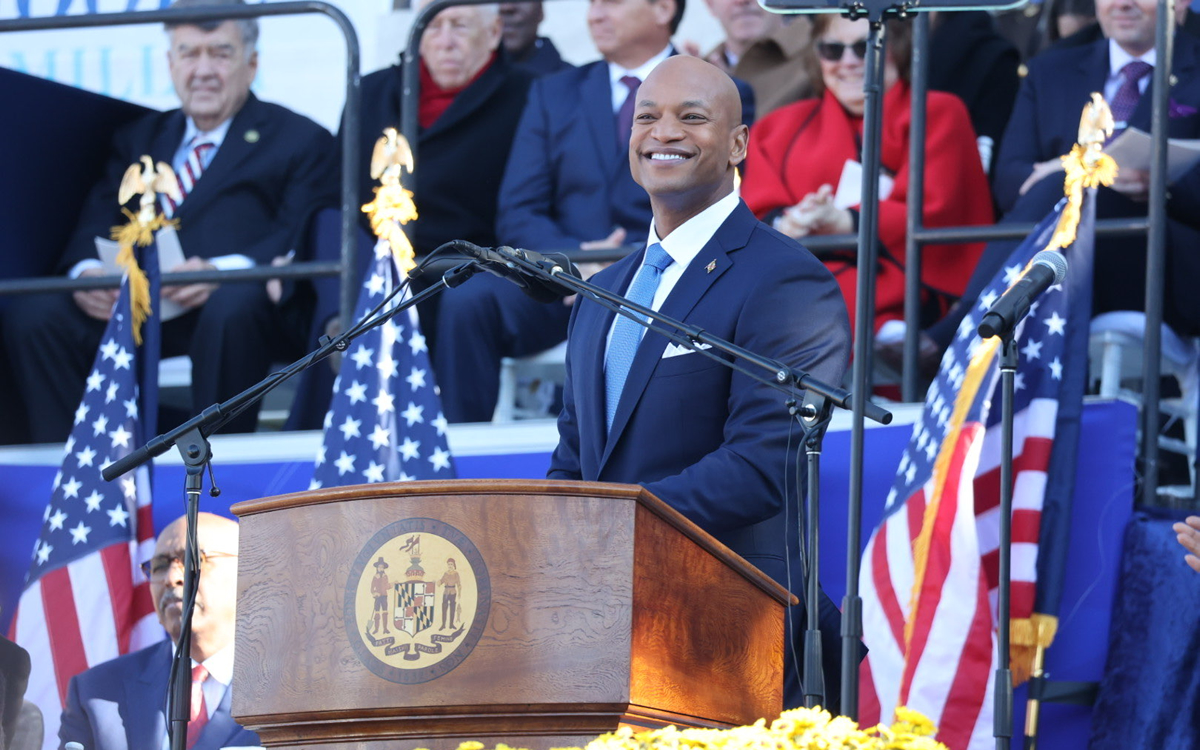News
Will Trump, gov’t agencies recognize Pride month?
Would be first GOP president to issue such a proclamation


Will President Trump recognize June as Pride month? (C-Span image)
Picture it: President Trump enters the East Room of the White House on a warm D.C. day in June to the sound of cheers from adoring members of the LGBT community holding up their iPhones to document the occasion with videos and photos.
With his daughter Ivanka Trump and son-in-law Jared Kushner at his side, Trump welcomes guests and commemorates June as Pride month by recognizing the LGBT community’s accomplishments in recent years.
Having trouble with this image? It could be because of the anti-LGBT positions and actions Trump and his administration have taken or perhaps because such an event would anger anti-LGBT groups that supported his election. It could be because instead of cheering him, LGBT people angered by his policies would boo Trump out of the room.
It might also be because recent reports Trump may have abused executive power or committed obstruction of justice raise questions about whether Trump will even be president in June.
Assuming Trump remains in office, it remains to be seen what steps he’ll take, if any, to recognize June as Pride month. Kelly Love, a White House spokesperson, said via email when asked if Trump would issue a Pride proclamation or host a White House Pride reception, “We will let you know as soon as we announce our June proclamations.”
During the 2016 election, Trump in an interview with ABC News’ Jonathan Karl said he’d “look into” whether he could issue a proclamation as president recognizing June as Pride month, essentially dodging the question.
“I would look into it,” Trump said. “And I feel so badly what happened [in Orlando]. And we have to do something about it.”
President Clinton started the tradition of issuing a proclamation to recognize June as Pride month. Although President George W. Bush discontinued that tradition, it was renewed by President Obama, who also in each of his years in office held a White House reception to celebrate Pride with members of the LGBT community.
If Trump were to continue the recognition of June as Pride month with either a proclamation or a reception, he would be the first Republican president to do so. It would also be consistent with his claims during the presidential campaign that he’s a bigger friend to LGBT people than his opponent, Hillary Clinton.
Gregory Angelo, president of Log Cabin Republicans, said his group — largely alone among LGBT organizations that support and interact with the Trump administration — has proposed the idea of Trump recognizing Pride, but no commitments were made.
“The suggestion has been formally made to the White House,” Angelo said. “Conversations are ongoing. It’s too soon to comment further.”
Given Trump’s predilection for photo ops — such as the pictures he’s taken with business leaders and presidents of historically black colleges — one possibility for Trump recognizing Pride is a shot of him in the Oval Office with Angelo and high-profile LGBT people who supported him like Peter Thiel, Caitlyn Jenner or Ric Grenell.
It’s not just whether Trump will recognize Pride that remains in question. In years past, the affinity groups for LGBT workers at federal departments hosted Pride celebrations.
Some of those celebrations were newer than others. The Pride celebration at the Pentagon only came about after “Don’t Ask, Don’t Tell” repeal in 2010, but celebrations at the U.S. Justice Department occurred even during the Bush administration and former U.S. Attorney General Michael Mukasey addressed LGBT employees in 2008. By the end of last year, virtually each of the departments had some kind of celebration.
Under the Obama administration, the heads of the departments were featured speakers at the Pride events and delivered remarks in solidarity with LGBT people. It’s certainly hard to imagine Attorney General Jeff Sessions addressing LGBT employees at the Justice Department.
The Washington Blade reached out to multiple affinity groups for LGBT federal workers, but — perhaps in a sign of fear of reprisal — they were largely silent on plans for Pride celebrations with June just a few weeks away. FedQ, the umbrella organization for the groups, didn’t respond to multiple requests for comment.
John Elias, president of DOJ Pride, was the only head of an LGBT affinity group to respond to the Blade’s request and would say only that plans are underway for some kind of Pride recognition.
“The Department’s LGBT Pride Month Observance Program is in the planning phase,” Elias said. “I expect the format will remain as it has been in recent years.”
Elias didn’t respond to a follow-up email on whether that meant Sessions would be invited to speak at the event and if he planned on attending as Eric Holder and Loretta Lynch did under the Obama administration.
UPDATE: After the initial publication of this article, a number of affinity for LGBT federal groups responded to affirm their agencies are set to hold events recognizing June as Pride month.
At the Small Business Administration, spokesperson Mark Gibson said, “Plans are currently underway but nothing is concrete as of yet.”
Rudy Reyns, president of DOD Pride, said an event would take place in Pentagon Center Courtyard on June 12 and Defense Secretary James Mattis has been invited to attend if his schedule allows.
A representative from HUD Glove said the group is planning four events to recognize June as Pride month. The group has invited HUD Secretary Ben Carson to speak, the representative said, although he hasn’t yet confirmed his attendance.

Maryland Gov. Wes Moore on Thursday signed a bill that seeks to combat efforts to ban books from state libraries.
House Bill 785, also known as the Freedom to Read Act, would establish a state policy “that local school systems operate their school library media programs consistent with certain standards; requiring each local school system to develop a policy and procedures to review objections to materials in a school library media program; prohibiting a county board of education from dismissing, demoting, suspending, disciplining, reassigning, transferring, or otherwise retaliating against certain school library media program personnel for performing their job duties consistent with certain standards.”
Moore on Thursday also signed House Bill 1386, which GLSEN notes will “develop guidelines for an anti-bias training program for school employees.”

The Mexican Senate on Thursday approved a bill that would ban so-called conversion therapy in the country.
Yaaj México, a Mexican LGBTQ rights group, on X noted the measure passed by a 77-4 vote margin with 15 abstentions. The Chamber of Deputies, the lower house of Mexico’s congress, approved the bill last month that, among other things, would subject conversion therapy practitioners to between two and six years in prison and fines.
The Senate on its X account described conversion therapy as “practices that have incentivized the violation of human rights of the LGBTTTIQ+ community.”
“The Senate moved (to) sanction therapies that impede or annul a person’s orientation or gender identity,” it said. “There are aggravating factors when the practices are done to minors, older adults and people with disabilities.”
Mexico City and the states of Oaxaca, Quintana Roo, Jalisco and Sonora are among the Mexican jurisdictions that have banned the discredited practice.
The Senate in 2022 passed a conversion therapy ban bill, but the House of Deputies did not approve it. It is not immediately clear whether President Andrés Manuel López Obrador supports the ban.
Canada, Brazil, Belgium, Germany, France, and New Zealand are among the countries that ban conversion therapy. Virginia, California, and D.C. are among the U.S. jurisdictions that prohibit the practice for minors.
The White House
Four states to ignore new Title IX rules protecting transgender students
Biden administration last Friday released final regulations

BY ERIN REED | Last Friday, the Biden administration released its final Title IX rules, which include protections for LGBTQ students by clarifying that Title IX forbids discrimination based on sexual orientation and gender identity.
The rule change could have a significant impact as it would supersede bathroom bans and other discriminatory policies that have become increasingly common in Republican states within the U.S.
As of Thursday morning, however, officials in at least four states — Oklahoma, Louisiana, Florida, and South Carolina — have directed schools to ignore the regulations, potentially setting up a federal showdown that may ultimately end up in a protracted court battle in the lead-up to the 2024 elections.
Louisiana State Superintendent of Education Cade Brumley was the first to respond, decrying the fact that the new Title IX regulations could block teachers and other students from exercising what has been dubbed by some a “right to bully” transgender students by using their old names and pronouns intentionally.
Asserting that Title IX law does not protect trans and queer students, Brumley states that schools “should not alter policies or procedures at this time.” Critically, several courts have ruled that trans and queer students are protected by Title IX, including the 4th U.S. Circuit Court of Appeals in a recent case in West Virginia.
In South Carolina, Schools Supt. Ellen Weaver wrote in a letter that providing protections for trans and LGBTQ students under Title IX “would rescind 50 years of progress and equality of opportunity by putting girls and women at a disadvantage in the educational arena,” apparently leaving trans kids out of her definition of those who deserve progress and equality of opportunity.
She then directed schools to ignore the new directive while waiting for court challenges. While South Carolina does not have a bathroom ban or statewide “Don’t Say Gay or Trans” law, such bills continue to be proposed in the state.
Responding to the South Carolina letter, Chase Glenn of Alliance For Full Acceptance stated, “While Supt. Weaver may not personally support the rights of LGBTQ+ students, she has the responsibility as the top school leader in our state to ensure that all students have equal rights and protections, and a safe place to learn and be themselves. The flagrant disregard shown for the Title IX rule tells me that our superintendent unfortunately does not have the best interests of all students in mind.”
Florida Education Commissioner Manny Diaz also joined in instructing schools not to implement Title IX regulations. In a letter issued to area schools, Diaz stated that the new Title IX regulations were tantamount to “gaslighting the country into believing that biological sex no longer has any meaning.”
Governor Ron DeSantis approved of the letter and stated that Florida “will not comply.” Florida has notably been the site of some of the most viciously anti-queer and anti-trans legislation in recent history, including a “Don’t Say Gay or Trans” law that was used to force a trans female teacher to go by “Mr.”
State Education Supt. Ryan Walters of Oklahoma was the latest to echo similar sentiments. Walters has recently appointed the right-wing media figure Chaya Raichik of Libs of TikTok to an advisory role “to improve school safety,” and notably, Raichik has posed proudly with papers accusing her of instigating bomb threats with her incendiary posts about LGBTQ people in classrooms.
The Title IX policies have been universally applauded by large LGBTQ rights organizations in the U.S. Lambda Legal, a key figure in fighting anti-LGBTQ legislation nationwide, said that the regulations “clearly cover LGBTQ+ students, as well as survivors and pregnant and parenting students across race and gender identity.” The Human Rights Campaign also praised the rule, stating, “rule will be life-changing for so many LGBTQ+ youth and help ensure LGBTQ+ students can receive the same educational experience as their peers: Going to dances, safely using the restroom, and writing stories that tell the truth about their own lives.”
The rule is slated to go into effect Aug. 1, pending any legal challenges.
****************************************************************************

Erin Reed is a transgender woman (she/her pronouns) and researcher who tracks anti-LGBTQ+ legislation around the world and helps people become better advocates for their queer family, friends, colleagues, and community. Reed also is a social media consultant and public speaker.
******************************************************************************************
The preceding article was first published at Erin In The Morning and is republished with permission.
-

 District of Columbia3 days ago
District of Columbia3 days agoCatching up with the asexuals and aromantics of D.C.
-

 State Department5 days ago
State Department5 days agoState Department releases annual human rights report
-

 South America3 days ago
South America3 days agoArgentina government dismisses transgender public sector employees
-

 Maine4 days ago
Maine4 days agoMaine governor signs transgender, abortion sanctuary bill into law












